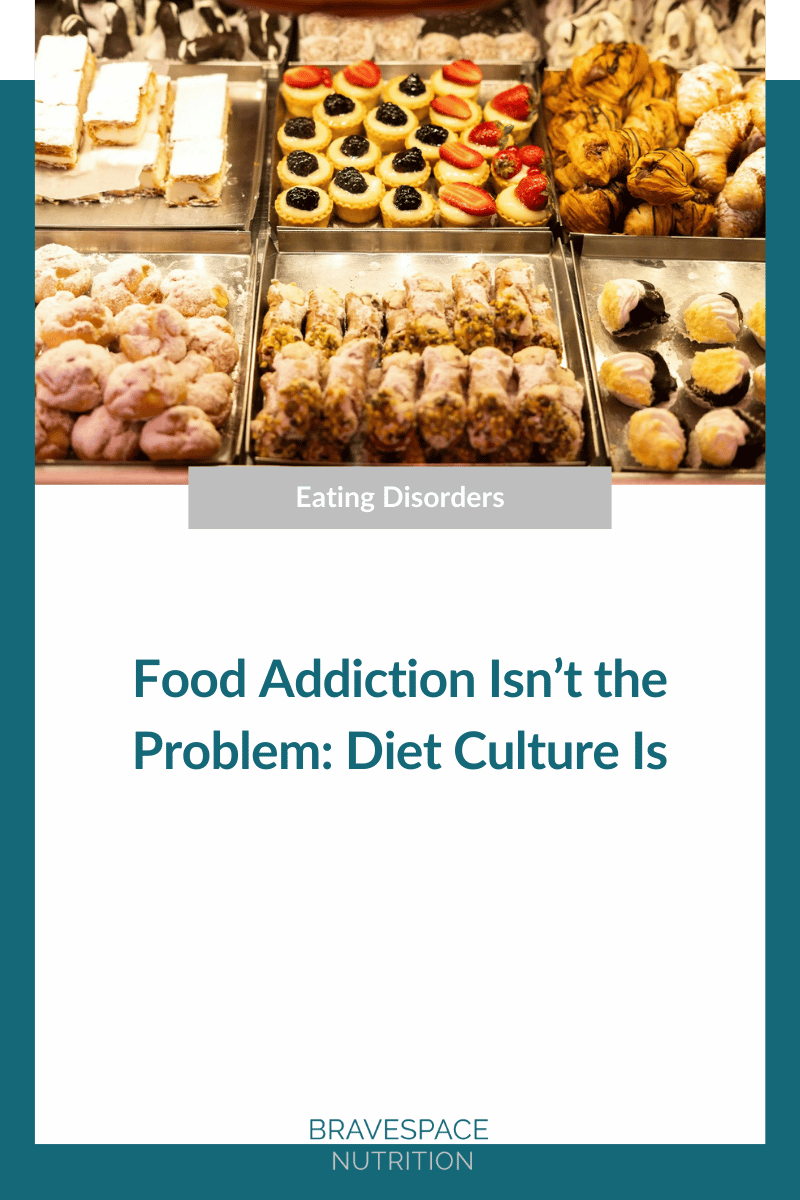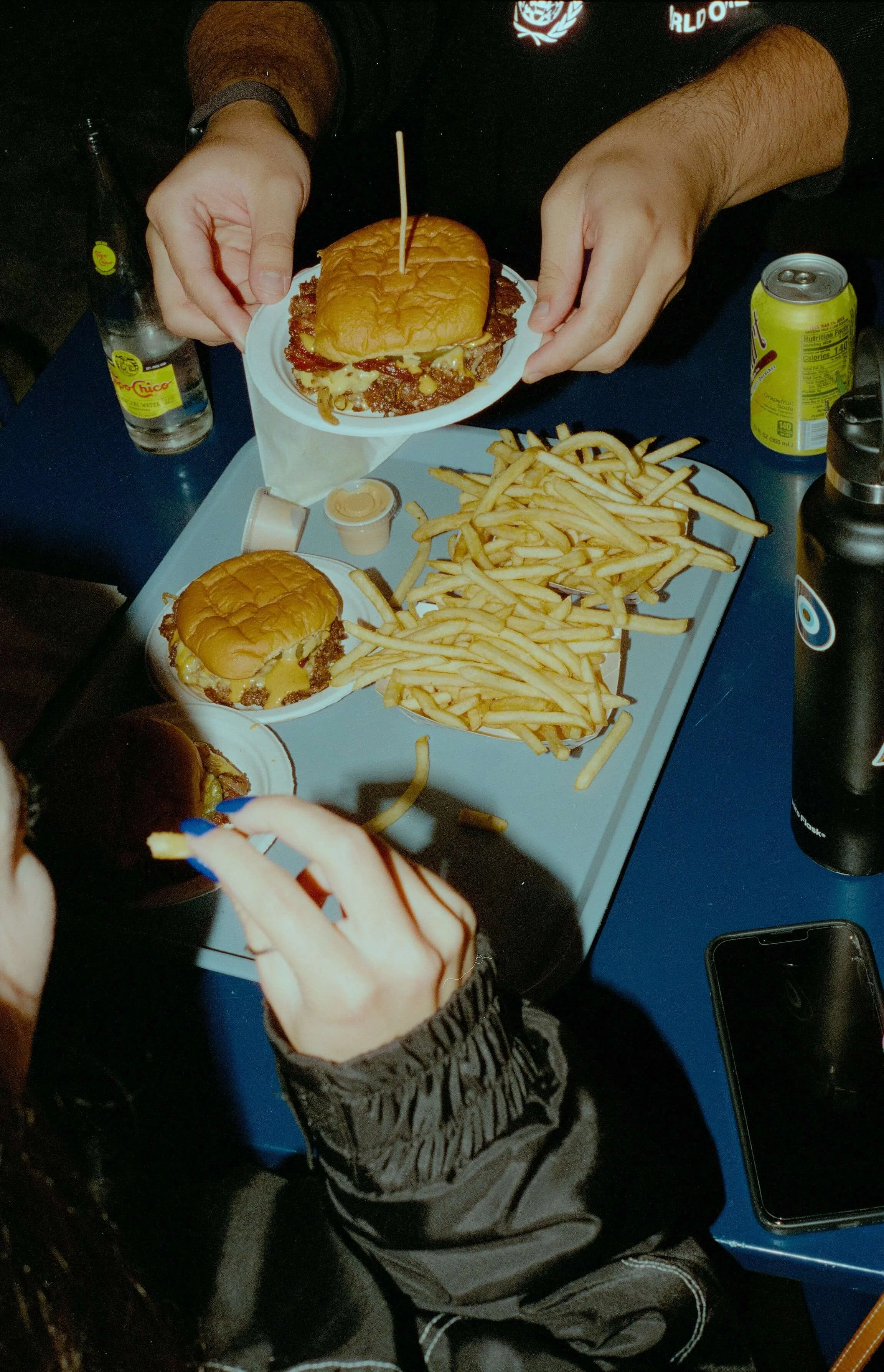Food Addiction Isn’t the Problem: Diet Culture Is
It’s common in diet culture to hear that certain foods are “addictive” and should be avoided.
At first, this might sound like helpful advice. But in reality, this framing often reinforces the shame already inside of you, the shame that whispers:
You’re out of control with food.
You can’t handle yourself.
You’re different because everyone else seems fine with food.
What Research Gets Wrong About “Food Addiction”
A lot of the research around food addiction doesn’t account for key factors that shape our eating patterns:
Dieting and restriction: Dieting itself can create the same symptoms often labeled as addictive like constant preoccupation with food, loss of control, and binge-restrict cycles (Dr. Kumaran, 2024).
Disordered eating and eating disorders: These are rarely controlled for in studies, even though they directly influence food behaviors.
Food inequities: A history of food insecurity or limited access to food has a huge impact on “addictive-like” symptoms, including thinking about food constantly or feeling a rush when eating certain foods.
And a surprising amount of this research isn’t even done on humans, most studies are conducted on rats (Testa et al., 2023, Appetite).
Finally, remember: food is not a drug. Unlike substances, we need food every day to survive.
Why the Term “Food Addiction” Can Feel Comforting
For many, labeling food as addictive can bring a sense of relief. I understand this personally, I used to feel the same way.
When you’ve felt out of control, feared certain foods, or struggled to keep them at home, it can feel easier to say:
“The problem isn’t me, it’s the food.”
That moment of relief can sound like:
“Phew, I thought there was something wrong with me!”
If you’ve spent years feeling broken around food, that feeling can feel validating.
Practical Tips to Reclaim Your Relationship with Food
1. Notice your body’s cues.
Before labeling a food as “addictive,” pause and ask: Am I truly hungry? Am I craving this for pleasure or possibly because I have rules around this food? Honoring these cues can slowly rebuild trust.
2. Reframe the language.
Instead of thinking “I’m addicted,” try: “I’m learning to listen to my body.” Words shape how we feel about ourselves.
3. Add foods without guilt.
Experiment with incorporating foods that bring joy, not shame. The goal isn’t perfection, it’s flexibility.
4. Focus on patterns, not perfection.
Notice cycles of food restriction and overeating without judgment. Understanding your patterns is more empowering than trying to “control” food.
Why It All Makes Sense
If you’ve ever felt addicted to food in the past or now, it’s important to know this: It makes sense.
Your nervous system is simply trying to protect you after years of dieting, food restriction, fear, and shame.
You don’t need to fight harder for control. You don’t need to resist more.
What you need is compassion for the parts of you that are afraid to trust food and your body again.
You deserve a relationship with food that feels safe, flexible, and free of shame.
Author bio: Katherine Metzelaar, RDN, CD, is an anti-diet registered dietitian and founder of Bravespace Nutrition. She helps people heal their relationship with food and body image, overcome diet culture pressures, and cultivate a compassionate, non-diet approach to eating and self-care. Katherine empowers her clients to trust their bodies, enjoy food without shame, and experience freedom from restrictive dieting.
Ready to Rebuild Trust with Food and Feel Calmer in Your Body?
Finding peace with food isn’t about more control, it’s about trust. But trust can take time after years of not trusting yourself with food. In her Seattle-based nutrition counseling practice, anti-diet dietitian Katherine Metzelaar, RDN helps people heal from food restriction cycles, binge eating, and body shame through intuitive eating and compassionate support. She offers help for eating disorders, body image healing, and chronic dieting, and also teaches You’re Not Broken-an online body image course designed to help you reconnect with your body and experience lasting freedom from diet culture.
For more information, explore the blog, FAQ, or contact page to get started.




